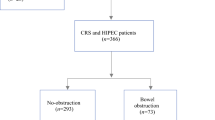Abstract
Background
Patients with stage IV cancer and bowel obstruction (BO) present a complicated management problem. We sought to determine if specific parameters could predict outcome after surgery.
Methods
Records of patients with stage IV cancer and BO treated from 1991 to 2008 were reviewed. For surgical patients, 30-day morbidity and 90-day mortality were assessed using exact multivariable logistic regression methods.
Results
Of 198 patients, 132 (66.7 %) underwent surgery, 66 medical treatment alone, and demographics were similar. A total of 41 patients (20.7 %) were diagnosed with stage IV cancer and BO synchronously, all treated surgically; the remaining presented metachronously. Medically managed patients were more likely to have received chemotherapy in the 30 days prior to BO (45 of 66 [68.2 %] vs 40 of 132 [30.3 %], p < .01). In the surgical group, 30-day morbidity was 35.6 %, while 90-day mortality was 42.3 %. Median overall survival for synchronous patients was 14.1 months (95 % confidence interval [95 % CI] 7.6–23.2), and 3.7 months (95 % CI 2.5–5.2) and 3.6 months (95 % CI 1.5–5.2) for metachronous patients treated surgically and medically, respectively. A multivariate model for 90-day surgical mortality identified low serum albumin, metachronous presentation, and ECOG > 1 as predictors of death (p < .05). A model for 30-day surgical morbidity yielded low hematocrit as a predictive factor (p < .05).
Conclusions
This cohort identifies characteristics indicative of morbidity and mortality in stage IV cancer and BO. Low serum albumin, ECOG > 1, and metachronous presentation predicted for 90-day surgical mortality. These data suggest factors that can be used to frame treatment discussion plans with patients.


Similar content being viewed by others
References
Tseng WH, Yang X, Wang H, Martinez SR, Chen SL, Meyers, et al. Nomogram to predict risk of 30-day morbidity and mortality for patients with disseminated malignancy undergoing surgical intervention. Ann Surg. 2011;254:333–8.
Ripamonti CI, Easson AM, Gerdes H. Management of malignant bowel obstruction. Eur J Cancer. 2008;44:1105–115.
Anthony R, Baron R, Mercadante S, Green S, Chi D, Cunningham J, et al. Report of the clinical protocol committee: development of randomized trials for malignant bowel obstruction. J Pain Symptom Manage. 2007;34:S49–59.
Ripamonti C, De Conno F, Ventafridda V, Rossi B, Baines MJ. Management of bowel obstruction in advanced and terminal cancer patients. Ann Oncol. 1993;4:15–21.
Turnbull ADM, Guerra J, Starnes HF. Results of surgery for obstructing carcinomatosis of gastrointestinal, pancreatic, or biliary origin. J Clin Oncol. 1989;7:381–6.
Grossman I, Klaase JM, Avenarius JKA, de Hingh IHJT, Mastboom WJB, Wiggers T. The strengths and limitations of routine staging before treatment with abdominal CT in colorectal cancer. BMC Cancer. 2011;11:433.
Legendre H, Vanhuyse F, Caroli-Bosc FX, Pector JC. Survival and quality of life after palliative surgery for neoplastic gastrointestinal obstruction. EJSO. 2001;27:362–7.
Moore Dalal K, Gollub MJ, Miner TJ, Wong WD, Gerdes H, Schattner MA, Jaques DP, Temple LKF. Management of patients with malignant bowel obstruction and stage IV colorectal cancer. J Palliat Med. 2011;14:822–8.
Feuer DJ, Broadley KE, Shepherd JH, Barton DPJ. Systematic review of surgery in malignant bowel obstruction in advanced gynecological and gastrointestinal cancer. Gynecol Oncol. 1999;75:313–22.
Miner TJ, Brennan MF, Jaques DP. A prospective, symptom related, outcomes analysis of 1022 palliative procedures for advanced cancer. Ann Surg. 2004;240:719–27.
Soriano A, Davis MP. Malignant bowel obstruction: individualized treatment near the end of life. Clev Clin J Med. 2011;78:197–206.
Lee HJ, Hong SP, Cheon JH, Kim TI, Min BS, Kim NK, et al. Long-term outcome of palliative therapy for malignant colorectal obstruction in patients with unresectable metastatic colorectal cancers: endoscopic stenting versus surgery. Gastrointest Endosc. 2011;73:535–42.
Khuri SF, Daley J, Henderson W, Barbour G, Lowry P, Irvin G, et al. The National Veterans Administration Surgical Risk Study: risk adjustment for the comparative assessment of the quality of surgical care. J Am Coll Surg. 1995;180:519–31.
Wright FC, Chakraborty A, Helyer L, Moravan V, Selby D. Predictors of survival in patients with non-curative stage IV cancer and malignant bowel obstruction. J Surg Oncol. 2010;101:425–9.
Badgwell BD, Smith K, Liu P, Bruera E, Curley SA, Cormier JN. Indicators of surgery and survival in oncology inpatients requiring surgical evaluation for palliation. Support Care Cancer. 2009;17:727–34.
Chakraborty A, Selby D, Gardiner K, Myers J, Moravan V, Wright F. Malignant bowel obstruction: natural history of a heterogeneous patient population followed prospectively over two years. J Pain Sympt Manage. 2011;41:412–20.
Weiss SM, Skibber JM, Rosato FE. Bowel obstruction in cancer patients: performance status as a predictor of survival. J Surg Oncol. 1984;25:15–7.
Angelelli G, Moschetta M, Cosmo T, Binetti F, Scardapane A, Ianora AA. CT diagnosis of the nature of bowel obstruction: morphological evaluation of the transition point. Radiol Med. 2012;117:749–58.
Author information
Authors and Affiliations
Corresponding author
Rights and permissions
About this article
Cite this article
Francescutti, V., Miller, A., Satchidanand, Y. et al. Management of Bowel Obstruction in Patients with Stage IV Cancer: Predictors of Outcome After Surgery. Ann Surg Oncol 20, 707–714 (2013). https://doi.org/10.1245/s10434-012-2662-2
Received:
Published:
Issue Date:
DOI: https://doi.org/10.1245/s10434-012-2662-2




